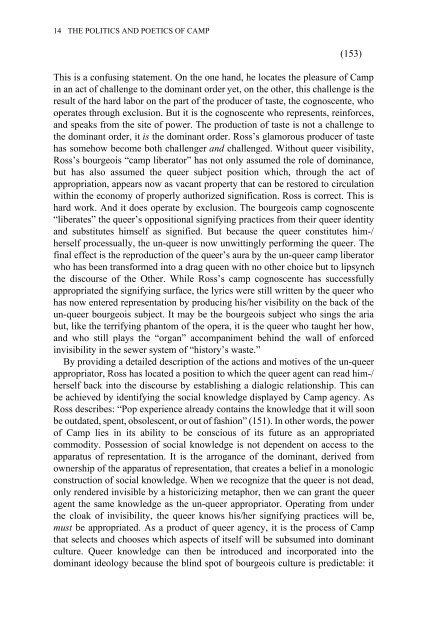Edited by Moe Meyer - Get a Free Blog
Edited by Moe Meyer - Get a Free Blog
Edited by Moe Meyer - Get a Free Blog
Create successful ePaper yourself
Turn your PDF publications into a flip-book with our unique Google optimized e-Paper software.
14 THE POLITICS AND POETICS OF CAMP<br />
(153)<br />
This is a confusing statement. On the one hand, he locates the pleasure of Camp<br />
in an act of challenge to the dominant order yet, on the other, this challenge is the<br />
result of the hard labor on the part of the producer of taste, the cognoscente, who<br />
operates through exclusion. But it is the cognoscente who represents, reinforces,<br />
and speaks from the site of power. The production of taste is not a challenge to<br />
the dominant order, it is the dominant order. Ross’s glamorous producer of taste<br />
has somehow become both challenger and challenged. Without queer visibility,<br />
Ross’s bourgeois “camp liberator” has not only assumed the role of dominance,<br />
but has also assumed the queer subject position which, through the act of<br />
appropriation, appears now as vacant property that can be restored to circulation<br />
within the economy of properly authorized signification. Ross is correct. This is<br />
hard work. And it does operate <strong>by</strong> exclusion. The bourgeois camp cognoscente<br />
“liberates” the queer’s oppositional signifying practices from their queer identity<br />
and substitutes himself as signified. But because the queer constitutes him-/<br />
herself processually, the un-queer is now unwittingly performing the queer. The<br />
final effect is the reproduction of the queer’s aura <strong>by</strong> the un-queer camp liberator<br />
who has been transformed into a drag queen with no other choice but to lipsynch<br />
the discourse of the Other. While Ross’s camp cognoscente has successfully<br />
appropriated the signifying surface, the lyrics were still written <strong>by</strong> the queer who<br />
has now entered representation <strong>by</strong> producing his/her visibility on the back of the<br />
un-queer bourgeois subject. It may be the bourgeois subject who sings the aria<br />
but, like the terrifying phantom of the opera, it is the queer who taught her how,<br />
and who still plays the “organ” accompaniment behind the wall of enforced<br />
invisibility in the sewer system of “history’s waste.”<br />
By providing a detailed description of the actions and motives of the un-queer<br />
appropriator, Ross has located a position to which the queer agent can read him-/<br />
herself back into the discourse <strong>by</strong> establishing a dialogic relationship. This can<br />
be achieved <strong>by</strong> identifying the social knowledge displayed <strong>by</strong> Camp agency. As<br />
Ross describes: “Pop experience already contains the knowledge that it will soon<br />
be outdated, spent, obsolescent, or out of fashion” (151). In other words, the power<br />
of Camp lies in its ability to be conscious of its future as an appropriated<br />
commodity. Possession of social knowledge is not dependent on access to the<br />
apparatus of representation. It is the arrogance of the dominant, derived from<br />
ownership of the apparatus of representation, that creates a belief in a monologic<br />
construction of social knowledge. When we recognize that the queer is not dead,<br />
only rendered invisible <strong>by</strong> a historicizing metaphor, then we can grant the queer<br />
agent the same knowledge as the un-queer appropriator. Operating from under<br />
the cloak of invisibility, the queer knows his/her signifying practices will be,<br />
must be appropriated. As a product of queer agency, it is the process of Camp<br />
that selects and chooses which aspects of itself will be subsumed into dominant<br />
culture. Queer knowledge can then be introduced and incorporated into the<br />
dominant ideology because the blind spot of bourgeois culture is predictable: it


